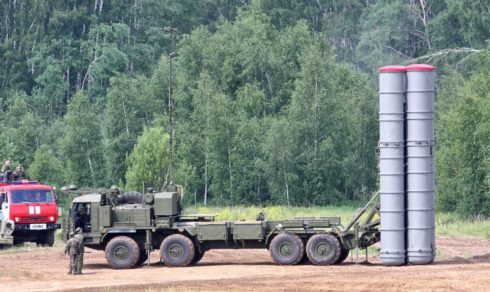Written by Andrei Akulov; Originally appeared on strategic-culture.org
The Russian army has been waiting impatiently for this moment. The famous S-400 Triumf surface-to-air missile (SAM) that is capable of ballistic-missile interception has been operational for quite some time, but it lacked one component that would make it the unquestioned world leader in air-defense technology. On October 18, the Russian military announced that the game-changing weapon was now finally on active duty. Over a thousand 40N6 long-range interceptor missiles are to be purchased as part of the 2027 state armament program to arm 56 S-400 battalions.
The two-stage solid-fuel missile, featuring a carrying hull and aerodynamic stabilizer fins, can hit cruise missiles, aircraft, and maneuvering reentry vehicles with a target velocity of 4,800 m/s (11,000 mph; Mach 14). It can be used against AWACS, J-STARS, EA-6B support jammers, and other high-value targets, such as tankers. Potential targets include the Northrop B-2 Spirit strategic bomber, MQ-9 Reaper armed drone, Tomahawk cruise missile, Boeing E-3 Sentry AWACS aircraft, and hypersonic cruise missiles.
The 40N6 is capable of exo-atmospheric interception. It can hit an IRBM (intermediate-range ballistic missile) warhead in its terminal phase. Its ballistic trajectory allows the active radar to illuminate stealth aircraft from above at certain angles.
Its operational range is 380 km (236 mi). During tests in May, it scored a hit from a distance of 480 km (298 mi). The 91N6E fire control and target-tracking radar is an agile pulse-to-pulse frequency hopper, which can detect and track targets within 600 km (373 mi). Three hundred of them can be tracked simultaneously.
It has a maximum altitude of 185 km (115 mi) and maximum target velocity of 4,800 m/s (11,000 mph; Mach 14). The missile’s average flight speed is 1,190 m/s (2,662 mph). It can hit a medium-range ballistic missile from 15 km (9.3 mi) away, at an altitude ranging from 10 m (33 ft) to 35 km (22 mi). Its response time is 15 seconds. The weapon has a guaranteed shelf life of 15 years and no maintenance is required.
The S-400’s TEL can hold only two missiles instead of the typical four, due to the 40N6 interceptor’s larger size. The missile weighs 1.9 tons. It uses a 180 kg high-explosive fragmentation warhead, which boasts an accuracy rate of 95%. The 300-meter radius fragmented-blast warhead ensures that targets are hit even if there is no kinetic impact.
It uses semi-active or active radar homing guidance. It can operate in an active regime and use its radar for targeting during the final trajectory phase. Thanks to its new homing head, the missile is effective against low-altitude targets at over-the-horizon range. A helicopter flying at an altitude of 5 km could become a target as this missile descends toward it from a great height.
The 40N6 converts potential energy into kinetic energy during the terminal phase of its flight, picking up speed before diving toward the target. It can continue to target on its own, even after losing contact with the ground-based systems, and do all this while being subjected to intensive electronic warfare.
The missile may well be integrated into the upcoming S-500 system, alongside longer-range munitions that are currently under development. Russian experts believe that with an upgrade it could be used as an anti-satellite weapon.
Now that the 40N6 is on active duty with the Russian armed forces, this is a game-changer that will give the military a new ability to bring down anything that flies. The weapon also provides ample opportunities for an upgrade. It turns the S-400 into a geopolitical weapons system with a long waiting list of committed buyers, as well as many others interested in potential purchases. No US sanctions can keep those customers away or quell their desire to get a bigger bang for their buck. India is a good example.





Thanks to Bolton, cancelling the INF. It looks like the Russian military were prepared a long time.
Exactly, long time. This missile was published “in duty” 11 years back. So You are right, it was long time.
Does it also fetch the newspaper, wash my laundry and prepare my breakfast? ;-)
So….., S-400 or Patriot, doesn’t seem to be much of a choice now does it? One’s a shiny sports car with beautiful chromed rims, leather interior, heated seats, superb car stereo and computer assisted steering, vs. the equivalent of a hillbilly shotgun wedding. Buy it or else uncles Trump and Bolton will come by with a double barrel sanctions gun.